Palliative Approach in Nursing: ACP Ethical Considerations Essay
VerifiedAdded on 2022/10/01
|7
|1766
|10
Essay
AI Summary
This essay examines Advance Care Planning (ACP), a crucial process for future well-being and end-of-life care, particularly for individuals with chronic or life-threatening illnesses. It delves into the ethical dilemmas faced by healthcare professionals, such as interpreting advance care plans and navigating decision-making models. The essay explores the ethical principles of self-determination, beneficence, justice, and non-maleficence, which guide ACP implementation. It outlines best practices for preparing and utilizing ACP/ACD, including accurate patient information and case conferences. The essay supports the use of ACP/ACD, emphasizing its role in optimizing quality of life, maintaining patient control, and aligning care with individual values. Finally, it provides an overview of the relevant Victorian legal framework for ACP, designed to empower individuals in making medical treatment decisions. References from relevant sources are also provided.

Running head: ADVANCE CARE PLANNING 1
Advance Care Planning
Student’s Name
Institutional Affiliation
Advance Care Planning
Student’s Name
Institutional Affiliation
Paraphrase This Document
Need a fresh take? Get an instant paraphrase of this document with our AI Paraphraser
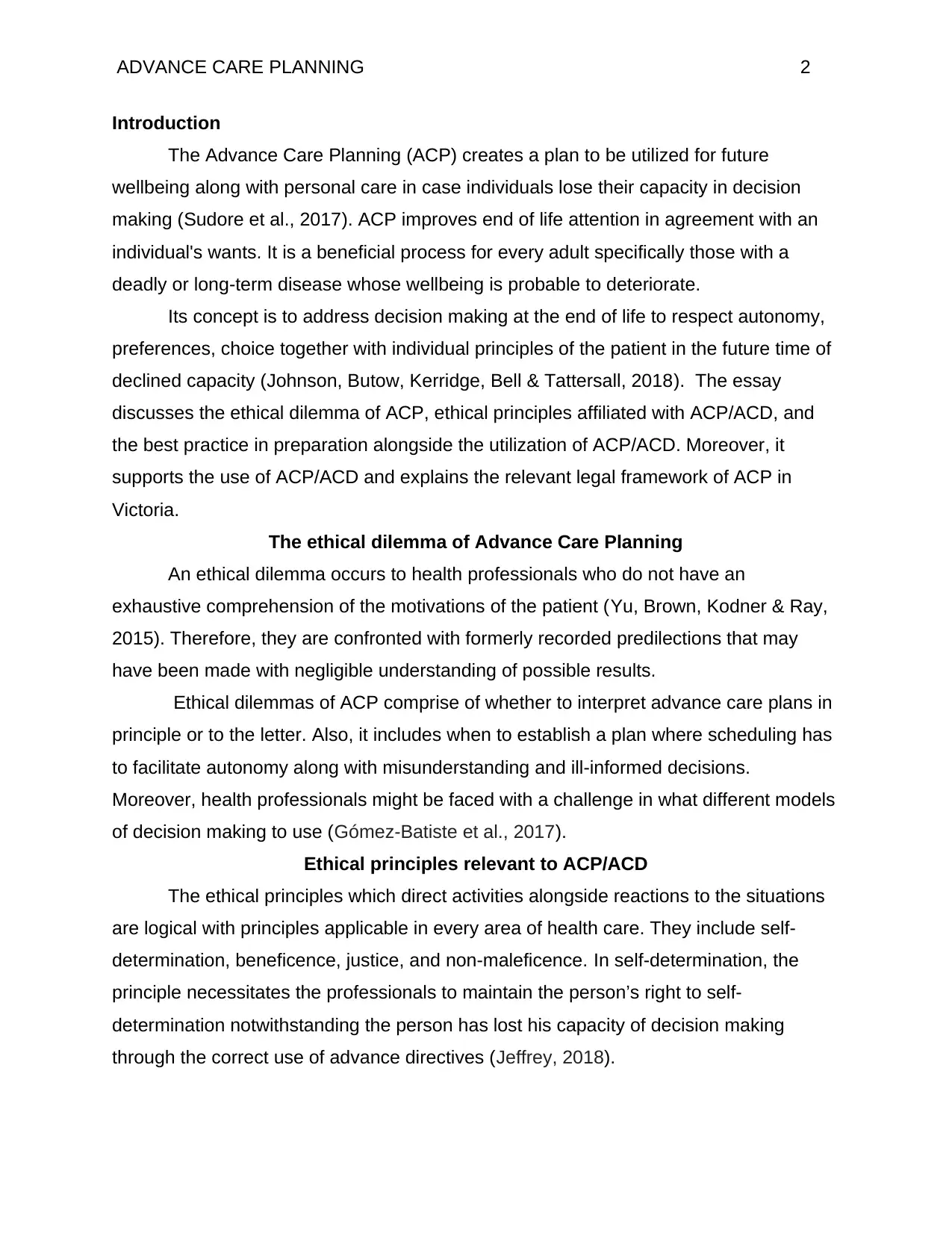
ADVANCE CARE PLANNING 2
Introduction
The Advance Care Planning (ACP) creates a plan to be utilized for future
wellbeing along with personal care in case individuals lose their capacity in decision
making (Sudore et al., 2017). ACP improves end of life attention in agreement with an
individual's wants. It is a beneficial process for every adult specifically those with a
deadly or long-term disease whose wellbeing is probable to deteriorate.
Its concept is to address decision making at the end of life to respect autonomy,
preferences, choice together with individual principles of the patient in the future time of
declined capacity (Johnson, Butow, Kerridge, Bell & Tattersall, 2018). The essay
discusses the ethical dilemma of ACP, ethical principles affiliated with ACP/ACD, and
the best practice in preparation alongside the utilization of ACP/ACD. Moreover, it
supports the use of ACP/ACD and explains the relevant legal framework of ACP in
Victoria.
The ethical dilemma of Advance Care Planning
An ethical dilemma occurs to health professionals who do not have an
exhaustive comprehension of the motivations of the patient (Yu, Brown, Kodner & Ray,
2015). Therefore, they are confronted with formerly recorded predilections that may
have been made with negligible understanding of possible results.
Ethical dilemmas of ACP comprise of whether to interpret advance care plans in
principle or to the letter. Also, it includes when to establish a plan where scheduling has
to facilitate autonomy along with misunderstanding and ill-informed decisions.
Moreover, health professionals might be faced with a challenge in what different models
of decision making to use (Gómez-Batiste et al., 2017).
Ethical principles relevant to ACP/ACD
The ethical principles which direct activities alongside reactions to the situations
are logical with principles applicable in every area of health care. They include self-
determination, beneficence, justice, and non-maleficence. In self-determination, the
principle necessitates the professionals to maintain the person’s right to self-
determination notwithstanding the person has lost his capacity of decision making
through the correct use of advance directives (Jeffrey, 2018).
Introduction
The Advance Care Planning (ACP) creates a plan to be utilized for future
wellbeing along with personal care in case individuals lose their capacity in decision
making (Sudore et al., 2017). ACP improves end of life attention in agreement with an
individual's wants. It is a beneficial process for every adult specifically those with a
deadly or long-term disease whose wellbeing is probable to deteriorate.
Its concept is to address decision making at the end of life to respect autonomy,
preferences, choice together with individual principles of the patient in the future time of
declined capacity (Johnson, Butow, Kerridge, Bell & Tattersall, 2018). The essay
discusses the ethical dilemma of ACP, ethical principles affiliated with ACP/ACD, and
the best practice in preparation alongside the utilization of ACP/ACD. Moreover, it
supports the use of ACP/ACD and explains the relevant legal framework of ACP in
Victoria.
The ethical dilemma of Advance Care Planning
An ethical dilemma occurs to health professionals who do not have an
exhaustive comprehension of the motivations of the patient (Yu, Brown, Kodner & Ray,
2015). Therefore, they are confronted with formerly recorded predilections that may
have been made with negligible understanding of possible results.
Ethical dilemmas of ACP comprise of whether to interpret advance care plans in
principle or to the letter. Also, it includes when to establish a plan where scheduling has
to facilitate autonomy along with misunderstanding and ill-informed decisions.
Moreover, health professionals might be faced with a challenge in what different models
of decision making to use (Gómez-Batiste et al., 2017).
Ethical principles relevant to ACP/ACD
The ethical principles which direct activities alongside reactions to the situations
are logical with principles applicable in every area of health care. They include self-
determination, beneficence, justice, and non-maleficence. In self-determination, the
principle necessitates the professionals to maintain the person’s right to self-
determination notwithstanding the person has lost his capacity of decision making
through the correct use of advance directives (Jeffrey, 2018).
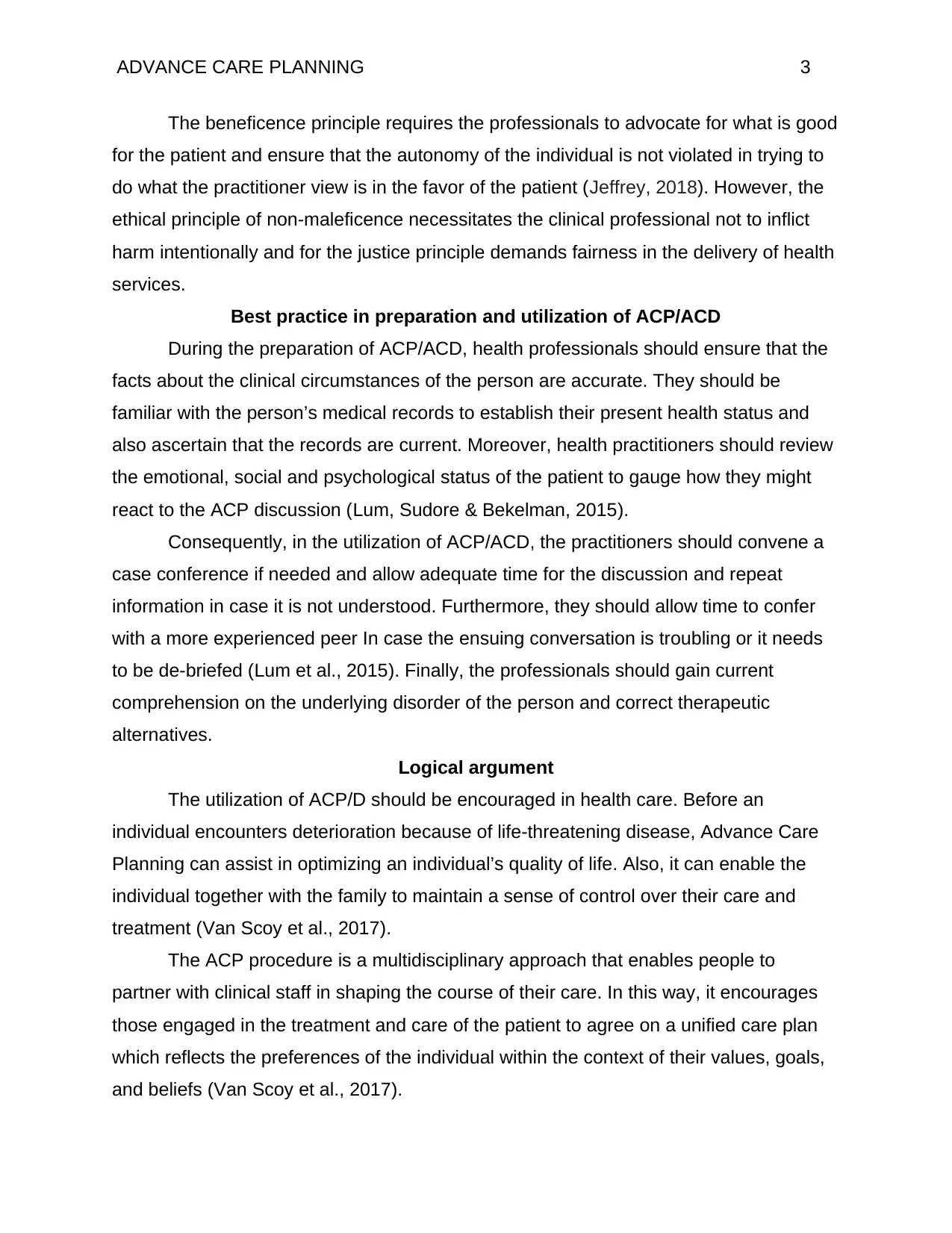
ADVANCE CARE PLANNING 3
The beneficence principle requires the professionals to advocate for what is good
for the patient and ensure that the autonomy of the individual is not violated in trying to
do what the practitioner view is in the favor of the patient (Jeffrey, 2018). However, the
ethical principle of non-maleficence necessitates the clinical professional not to inflict
harm intentionally and for the justice principle demands fairness in the delivery of health
services.
Best practice in preparation and utilization of ACP/ACD
During the preparation of ACP/ACD, health professionals should ensure that the
facts about the clinical circumstances of the person are accurate. They should be
familiar with the person’s medical records to establish their present health status and
also ascertain that the records are current. Moreover, health practitioners should review
the emotional, social and psychological status of the patient to gauge how they might
react to the ACP discussion (Lum, Sudore & Bekelman, 2015).
Consequently, in the utilization of ACP/ACD, the practitioners should convene a
case conference if needed and allow adequate time for the discussion and repeat
information in case it is not understood. Furthermore, they should allow time to confer
with a more experienced peer In case the ensuing conversation is troubling or it needs
to be de-briefed (Lum et al., 2015). Finally, the professionals should gain current
comprehension on the underlying disorder of the person and correct therapeutic
alternatives.
Logical argument
The utilization of ACP/D should be encouraged in health care. Before an
individual encounters deterioration because of life-threatening disease, Advance Care
Planning can assist in optimizing an individual’s quality of life. Also, it can enable the
individual together with the family to maintain a sense of control over their care and
treatment (Van Scoy et al., 2017).
The ACP procedure is a multidisciplinary approach that enables people to
partner with clinical staff in shaping the course of their care. In this way, it encourages
those engaged in the treatment and care of the patient to agree on a unified care plan
which reflects the preferences of the individual within the context of their values, goals,
and beliefs (Van Scoy et al., 2017).
The beneficence principle requires the professionals to advocate for what is good
for the patient and ensure that the autonomy of the individual is not violated in trying to
do what the practitioner view is in the favor of the patient (Jeffrey, 2018). However, the
ethical principle of non-maleficence necessitates the clinical professional not to inflict
harm intentionally and for the justice principle demands fairness in the delivery of health
services.
Best practice in preparation and utilization of ACP/ACD
During the preparation of ACP/ACD, health professionals should ensure that the
facts about the clinical circumstances of the person are accurate. They should be
familiar with the person’s medical records to establish their present health status and
also ascertain that the records are current. Moreover, health practitioners should review
the emotional, social and psychological status of the patient to gauge how they might
react to the ACP discussion (Lum, Sudore & Bekelman, 2015).
Consequently, in the utilization of ACP/ACD, the practitioners should convene a
case conference if needed and allow adequate time for the discussion and repeat
information in case it is not understood. Furthermore, they should allow time to confer
with a more experienced peer In case the ensuing conversation is troubling or it needs
to be de-briefed (Lum et al., 2015). Finally, the professionals should gain current
comprehension on the underlying disorder of the person and correct therapeutic
alternatives.
Logical argument
The utilization of ACP/D should be encouraged in health care. Before an
individual encounters deterioration because of life-threatening disease, Advance Care
Planning can assist in optimizing an individual’s quality of life. Also, it can enable the
individual together with the family to maintain a sense of control over their care and
treatment (Van Scoy et al., 2017).
The ACP procedure is a multidisciplinary approach that enables people to
partner with clinical staff in shaping the course of their care. In this way, it encourages
those engaged in the treatment and care of the patient to agree on a unified care plan
which reflects the preferences of the individual within the context of their values, goals,
and beliefs (Van Scoy et al., 2017).
⊘ This is a preview!⊘
Do you want full access?
Subscribe today to unlock all pages.

Trusted by 1+ million students worldwide
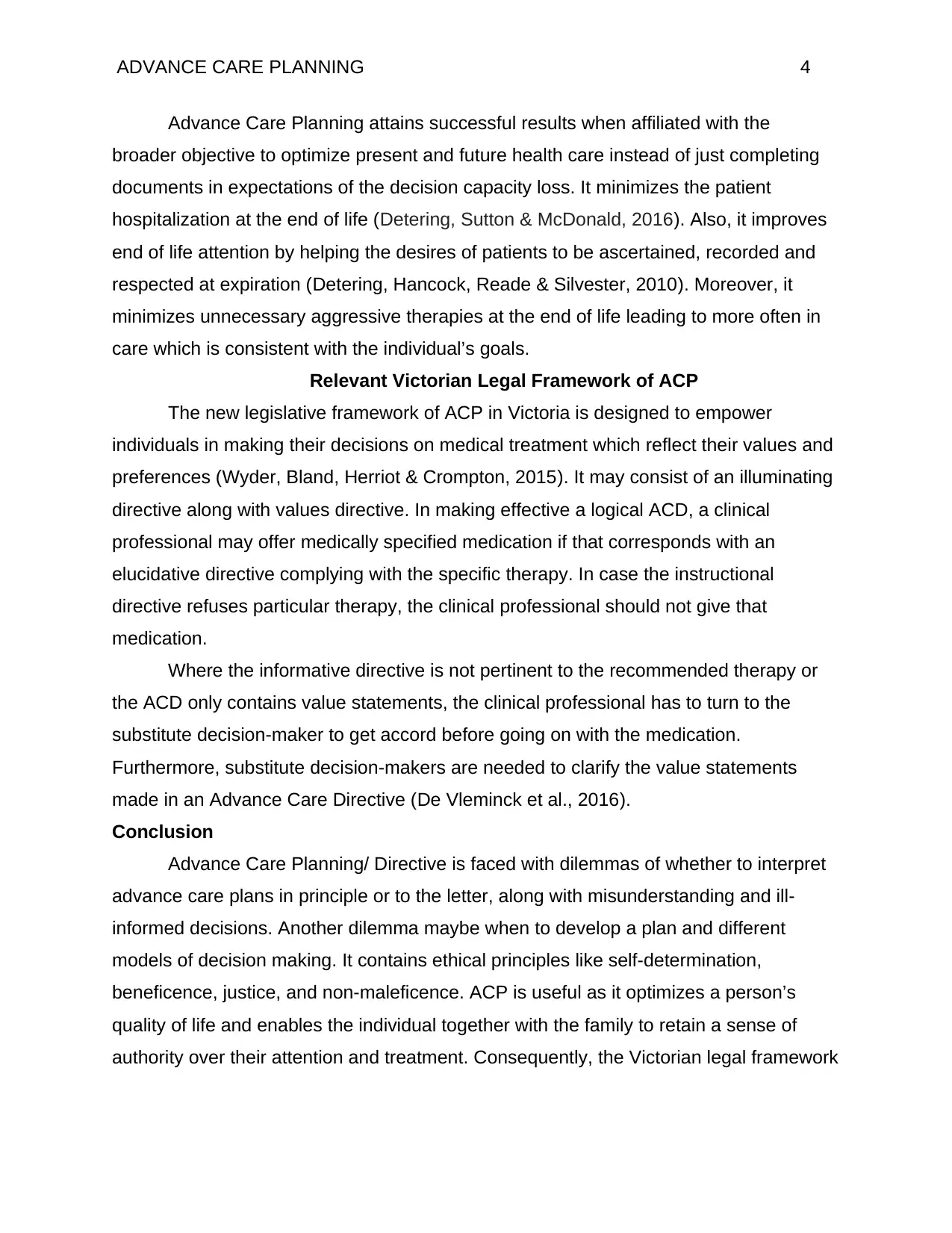
ADVANCE CARE PLANNING 4
Advance Care Planning attains successful results when affiliated with the
broader objective to optimize present and future health care instead of just completing
documents in expectations of the decision capacity loss. It minimizes the patient
hospitalization at the end of life (Detering, Sutton & McDonald, 2016). Also, it improves
end of life attention by helping the desires of patients to be ascertained, recorded and
respected at expiration (Detering, Hancock, Reade & Silvester, 2010). Moreover, it
minimizes unnecessary aggressive therapies at the end of life leading to more often in
care which is consistent with the individual’s goals.
Relevant Victorian Legal Framework of ACP
The new legislative framework of ACP in Victoria is designed to empower
individuals in making their decisions on medical treatment which reflect their values and
preferences (Wyder, Bland, Herriot & Crompton, 2015). It may consist of an illuminating
directive along with values directive. In making effective a logical ACD, a clinical
professional may offer medically specified medication if that corresponds with an
elucidative directive complying with the specific therapy. In case the instructional
directive refuses particular therapy, the clinical professional should not give that
medication.
Where the informative directive is not pertinent to the recommended therapy or
the ACD only contains value statements, the clinical professional has to turn to the
substitute decision-maker to get accord before going on with the medication.
Furthermore, substitute decision-makers are needed to clarify the value statements
made in an Advance Care Directive (De Vleminck et al., 2016).
Conclusion
Advance Care Planning/ Directive is faced with dilemmas of whether to interpret
advance care plans in principle or to the letter, along with misunderstanding and ill-
informed decisions. Another dilemma maybe when to develop a plan and different
models of decision making. It contains ethical principles like self-determination,
beneficence, justice, and non-maleficence. ACP is useful as it optimizes a person’s
quality of life and enables the individual together with the family to retain a sense of
authority over their attention and treatment. Consequently, the Victorian legal framework
Advance Care Planning attains successful results when affiliated with the
broader objective to optimize present and future health care instead of just completing
documents in expectations of the decision capacity loss. It minimizes the patient
hospitalization at the end of life (Detering, Sutton & McDonald, 2016). Also, it improves
end of life attention by helping the desires of patients to be ascertained, recorded and
respected at expiration (Detering, Hancock, Reade & Silvester, 2010). Moreover, it
minimizes unnecessary aggressive therapies at the end of life leading to more often in
care which is consistent with the individual’s goals.
Relevant Victorian Legal Framework of ACP
The new legislative framework of ACP in Victoria is designed to empower
individuals in making their decisions on medical treatment which reflect their values and
preferences (Wyder, Bland, Herriot & Crompton, 2015). It may consist of an illuminating
directive along with values directive. In making effective a logical ACD, a clinical
professional may offer medically specified medication if that corresponds with an
elucidative directive complying with the specific therapy. In case the instructional
directive refuses particular therapy, the clinical professional should not give that
medication.
Where the informative directive is not pertinent to the recommended therapy or
the ACD only contains value statements, the clinical professional has to turn to the
substitute decision-maker to get accord before going on with the medication.
Furthermore, substitute decision-makers are needed to clarify the value statements
made in an Advance Care Directive (De Vleminck et al., 2016).
Conclusion
Advance Care Planning/ Directive is faced with dilemmas of whether to interpret
advance care plans in principle or to the letter, along with misunderstanding and ill-
informed decisions. Another dilemma maybe when to develop a plan and different
models of decision making. It contains ethical principles like self-determination,
beneficence, justice, and non-maleficence. ACP is useful as it optimizes a person’s
quality of life and enables the individual together with the family to retain a sense of
authority over their attention and treatment. Consequently, the Victorian legal framework
Paraphrase This Document
Need a fresh take? Get an instant paraphrase of this document with our AI Paraphraser
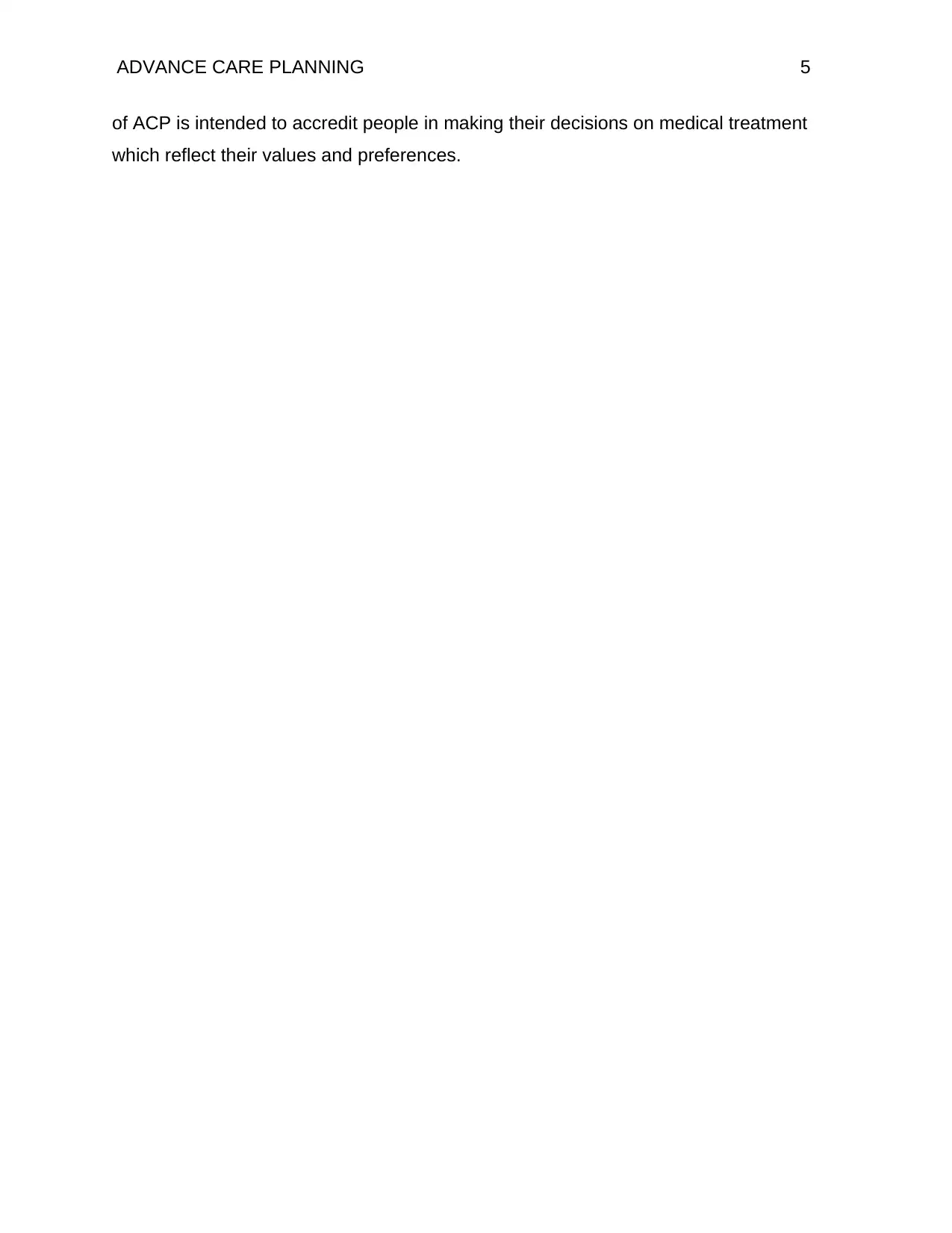
ADVANCE CARE PLANNING 5
of ACP is intended to accredit people in making their decisions on medical treatment
which reflect their values and preferences.
of ACP is intended to accredit people in making their decisions on medical treatment
which reflect their values and preferences.
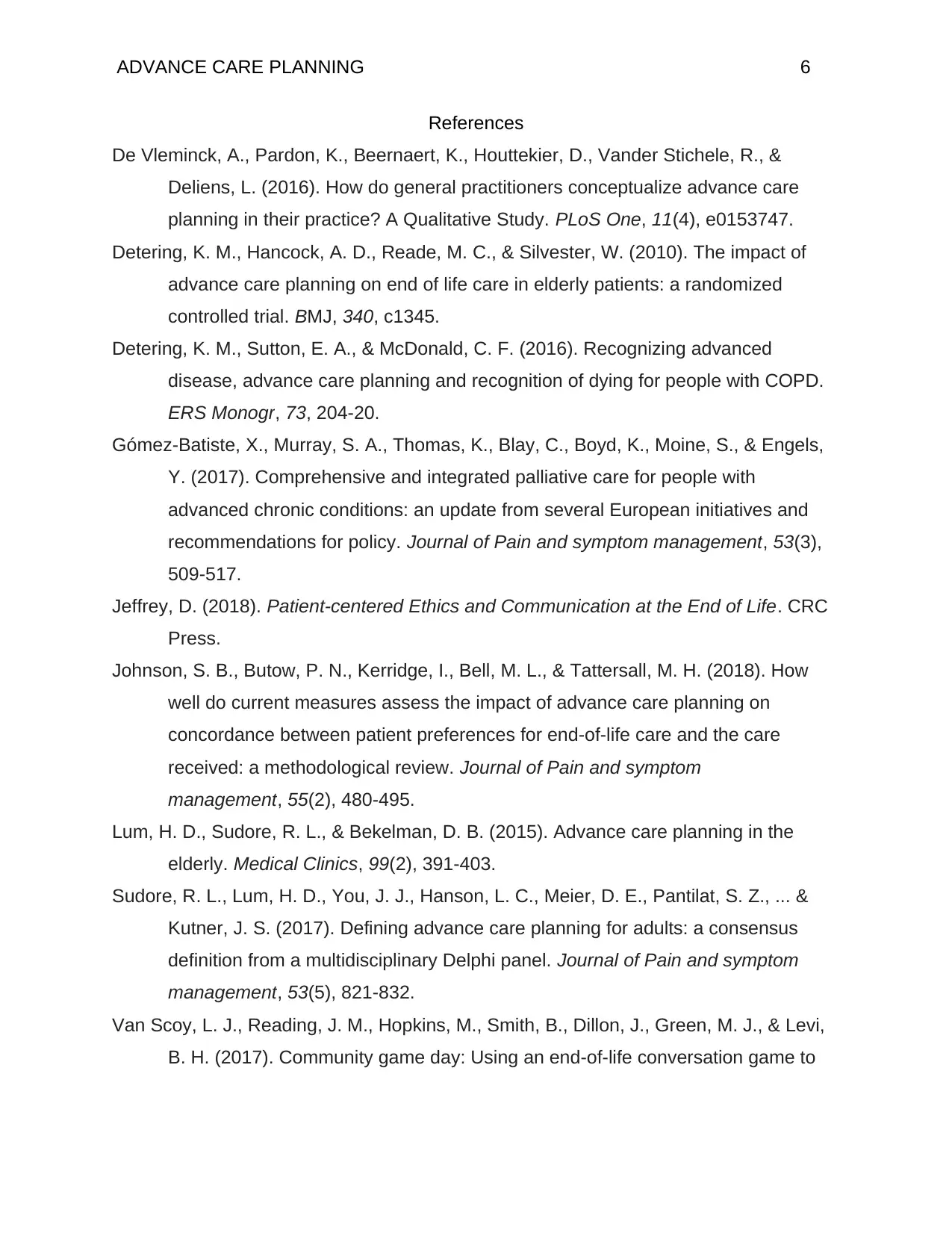
ADVANCE CARE PLANNING 6
References
De Vleminck, A., Pardon, K., Beernaert, K., Houttekier, D., Vander Stichele, R., &
Deliens, L. (2016). How do general practitioners conceptualize advance care
planning in their practice? A Qualitative Study. PLoS One, 11(4), e0153747.
Detering, K. M., Hancock, A. D., Reade, M. C., & Silvester, W. (2010). The impact of
advance care planning on end of life care in elderly patients: a randomized
controlled trial. BMJ, 340, c1345.
Detering, K. M., Sutton, E. A., & McDonald, C. F. (2016). Recognizing advanced
disease, advance care planning and recognition of dying for people with COPD.
ERS Monogr, 73, 204-20.
Gómez-Batiste, X., Murray, S. A., Thomas, K., Blay, C., Boyd, K., Moine, S., & Engels,
Y. (2017). Comprehensive and integrated palliative care for people with
advanced chronic conditions: an update from several European initiatives and
recommendations for policy. Journal of Pain and symptom management, 53(3),
509-517.
Jeffrey, D. (2018). Patient-centered Ethics and Communication at the End of Life. CRC
Press.
Johnson, S. B., Butow, P. N., Kerridge, I., Bell, M. L., & Tattersall, M. H. (2018). How
well do current measures assess the impact of advance care planning on
concordance between patient preferences for end-of-life care and the care
received: a methodological review. Journal of Pain and symptom
management, 55(2), 480-495.
Lum, H. D., Sudore, R. L., & Bekelman, D. B. (2015). Advance care planning in the
elderly. Medical Clinics, 99(2), 391-403.
Sudore, R. L., Lum, H. D., You, J. J., Hanson, L. C., Meier, D. E., Pantilat, S. Z., ... &
Kutner, J. S. (2017). Defining advance care planning for adults: a consensus
definition from a multidisciplinary Delphi panel. Journal of Pain and symptom
management, 53(5), 821-832.
Van Scoy, L. J., Reading, J. M., Hopkins, M., Smith, B., Dillon, J., Green, M. J., & Levi,
B. H. (2017). Community game day: Using an end-of-life conversation game to
References
De Vleminck, A., Pardon, K., Beernaert, K., Houttekier, D., Vander Stichele, R., &
Deliens, L. (2016). How do general practitioners conceptualize advance care
planning in their practice? A Qualitative Study. PLoS One, 11(4), e0153747.
Detering, K. M., Hancock, A. D., Reade, M. C., & Silvester, W. (2010). The impact of
advance care planning on end of life care in elderly patients: a randomized
controlled trial. BMJ, 340, c1345.
Detering, K. M., Sutton, E. A., & McDonald, C. F. (2016). Recognizing advanced
disease, advance care planning and recognition of dying for people with COPD.
ERS Monogr, 73, 204-20.
Gómez-Batiste, X., Murray, S. A., Thomas, K., Blay, C., Boyd, K., Moine, S., & Engels,
Y. (2017). Comprehensive and integrated palliative care for people with
advanced chronic conditions: an update from several European initiatives and
recommendations for policy. Journal of Pain and symptom management, 53(3),
509-517.
Jeffrey, D. (2018). Patient-centered Ethics and Communication at the End of Life. CRC
Press.
Johnson, S. B., Butow, P. N., Kerridge, I., Bell, M. L., & Tattersall, M. H. (2018). How
well do current measures assess the impact of advance care planning on
concordance between patient preferences for end-of-life care and the care
received: a methodological review. Journal of Pain and symptom
management, 55(2), 480-495.
Lum, H. D., Sudore, R. L., & Bekelman, D. B. (2015). Advance care planning in the
elderly. Medical Clinics, 99(2), 391-403.
Sudore, R. L., Lum, H. D., You, J. J., Hanson, L. C., Meier, D. E., Pantilat, S. Z., ... &
Kutner, J. S. (2017). Defining advance care planning for adults: a consensus
definition from a multidisciplinary Delphi panel. Journal of Pain and symptom
management, 53(5), 821-832.
Van Scoy, L. J., Reading, J. M., Hopkins, M., Smith, B., Dillon, J., Green, M. J., & Levi,
B. H. (2017). Community game day: Using an end-of-life conversation game to
⊘ This is a preview!⊘
Do you want full access?
Subscribe today to unlock all pages.

Trusted by 1+ million students worldwide
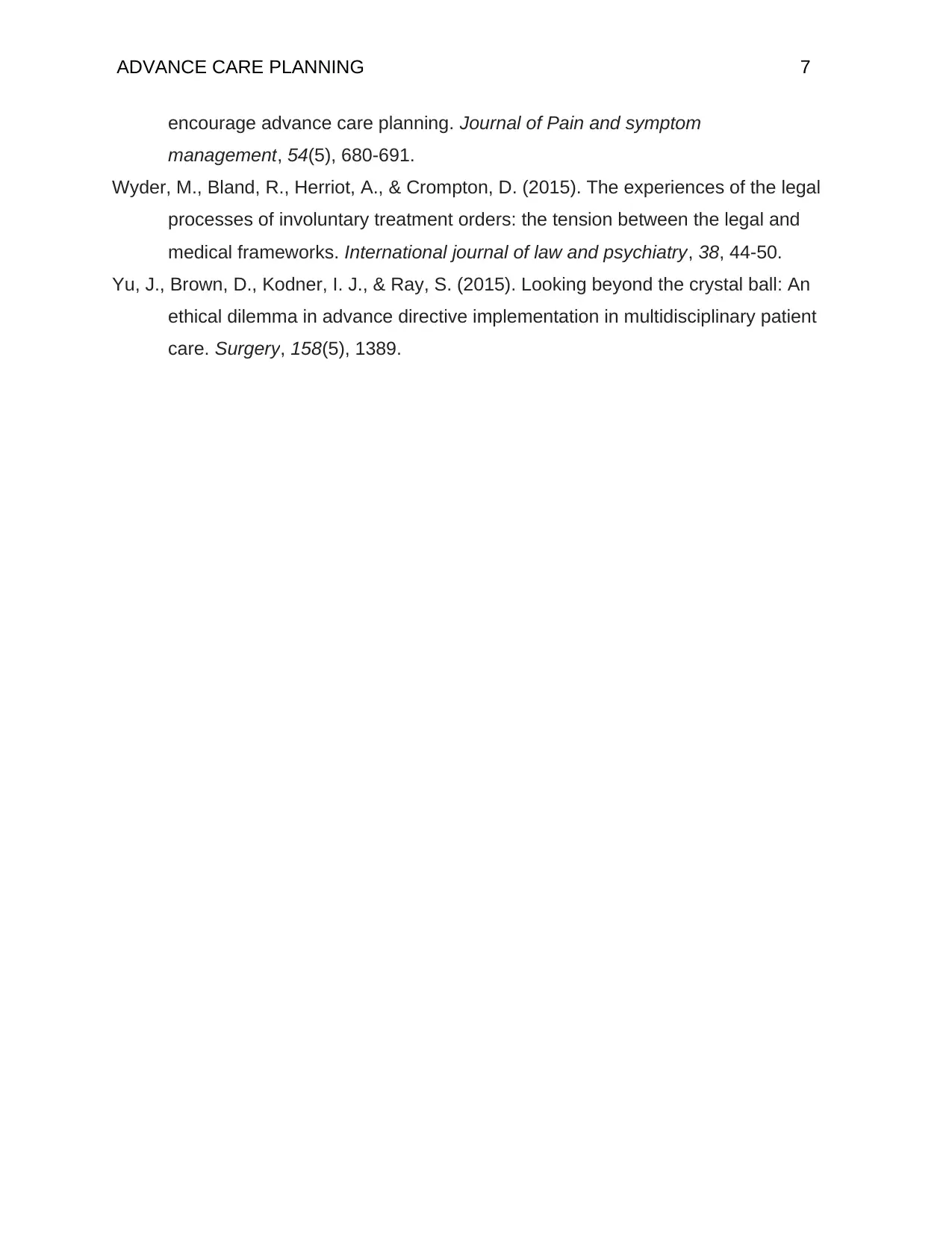
ADVANCE CARE PLANNING 7
encourage advance care planning. Journal of Pain and symptom
management, 54(5), 680-691.
Wyder, M., Bland, R., Herriot, A., & Crompton, D. (2015). The experiences of the legal
processes of involuntary treatment orders: the tension between the legal and
medical frameworks. International journal of law and psychiatry, 38, 44-50.
Yu, J., Brown, D., Kodner, I. J., & Ray, S. (2015). Looking beyond the crystal ball: An
ethical dilemma in advance directive implementation in multidisciplinary patient
care. Surgery, 158(5), 1389.
encourage advance care planning. Journal of Pain and symptom
management, 54(5), 680-691.
Wyder, M., Bland, R., Herriot, A., & Crompton, D. (2015). The experiences of the legal
processes of involuntary treatment orders: the tension between the legal and
medical frameworks. International journal of law and psychiatry, 38, 44-50.
Yu, J., Brown, D., Kodner, I. J., & Ray, S. (2015). Looking beyond the crystal ball: An
ethical dilemma in advance directive implementation in multidisciplinary patient
care. Surgery, 158(5), 1389.
1 out of 7
Related Documents
Your All-in-One AI-Powered Toolkit for Academic Success.
+13062052269
info@desklib.com
Available 24*7 on WhatsApp / Email
![[object Object]](/_next/static/media/star-bottom.7253800d.svg)
Unlock your academic potential
Copyright © 2020–2026 A2Z Services. All Rights Reserved. Developed and managed by ZUCOL.





